Stay in the know on all smart updates of your favorite topics.
Unmanned systems & sustainability @Formula 1

Unmanned systems; Developments & challenges
<strong>Pieter Elands,</strong> Program Manager Unmanned Systems at TNO, is an experienced manager of people and complex research programs. Pieter will share insights into the latest developments and key challenges in the field of unmanned systems. With a strong background in Aerospace and Defence, responsibility for coordinating research on unmanned systems and extensive knowledge of how unmanned systems are deployed in today’s military operations, the talk will explore technological, organizational, and strategic challenges.
Sustainability at the F1 Heineken Dutch Grand Prix
Dimitri Bonthuis is director Media & Sports Development at SportVibes and currently involved in major events like ABN AMRO Open and F1 Heineken Dutch Grand Prix. At the Dutch GP he is responsible for sustainability. This evening, Dimitri will talk about his experiences with sustainability at the Grand Prix, exploring how he approaches the topic, which innovations have been key, the challenges of driving sustainable initiatives, and how these efforts fit into a broader strategic vision.
21.00 Networking with coffee/tea
The Amsterdam Hunger Game

Learn with the case study Amsterdam to anticipate future food disruptions. Understand the city's food supply chain vulnerabilities is critical for enhancing food resilience. Enhance food resilience in empowerment of people in urban food growing.
Demoday #27: Zero Emission City Logistics - The Food Center Amsterdam Case. Hosted by the Interdisciplinary Graduation Circle (HvA)
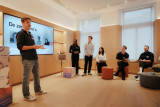
Amsterdam faces a major logistics challenge: from January 2025 onwards, polluting delivery vans will no longer be allowed in the city centre. How can entrepreneurs and suppliers in the food sector prepare for this and turn the transition into a success? Four fourth-year students from the Amsterdam University of Applied Sciences (HvA) are working together in an interdisciplinary graduation circle to find solutions. They are addressing both the technical aspects of this issue and the communication side. Drawing on their different fields of study, they analyse the problem and develop a joint recommendation for the Amsterdam Transport Region (Vervoerregio Amsterdam). As part of their research, they used this working session as a focus group with stakeholders from the Amsterdam InChange network.
Opening of the session
Stan van der Meer (Logistics Management), Chanel Pinas (Digital Marketing), Jay van den Boog (Digital Marketing), and Vanessa Man (Logistics Engineering) opened the session with a few questions to get a sense of the participants in the room. The attendees rated their own level of expertise on the topic and wrote down a word they associated with the issue.
The room was filled with expertise: policymakers from the Municipality of Amsterdam directly involved in the issue, as well as researchers and advisors from Arcadis and Cenex who are actively working on zero-emission logistics. Representatives from the Port of Amsterdam and EIT Urban Mobility (a European network) were also present, each bringing their own perspective on the challenge.
Statements and discussion
The students facilitated the discussion by presenting a number of statements, and moderating the group discussions that followed. Below are a few observations.
Statements 1 and 2 (summarized): Amsterdam entrepreneurs are aware of the new zero-emission policy, and it is clearly presented to them.
There was broad consensus within the group regarding the city’s policy. Communication from the Municipality of Amsterdam has been extensive over the past ten years — first targeting larger logistics partners in the city, and more recently also via letters to local entrepreneurs. In addition, physical signs throughout the city communicate the new regulations. However, what can cause confusion among entrepreneurs are the mixed signals coming from national politics and policies. This can create the impression that there is a lack of determination or vision behind the transition, making entrepreneurs hesitant to invest in new electric vehicles.
Statement 3: There is sufficient support for entrepreneurs to switch to zero-emission transport.
The group also agreed that the municipality is doing a good job offering financial support where needed. Advisors, for example, are available to guide entrepreneurs through the rules and support options. However, it was noted that the target audience still does not always have a clear overview of all the possibilities. While the municipality communicates well and “presents” the available opportunities, confusion and uncertainty remain among entrepreneurs on the streets. This represents an important communication challenge that the students will further explore.
Also, regarding this statement and the ones before, it was noted that the (micro)entrepreneurs and stakeholders we were talking about weren't present in the room. It would have been good to have more of the target group in the room, but for this session specifically the policymakers and specialists from our network were the ones the students focussed on. In the following months of their research, their focus will be on the specialists and (micro)entrepreneurs in the food sector.
Statement 4: Logistics hubs play an important role in reducing transport movements in the city.
This part of the discussion became more technical. The group agreed that a new logistics system with greater use of hubs throughout the city is, in theory, a logical and effective step in this transition. In practice, however, it is not as simple as it sounds. For example, consider the Port of Amsterdam — an existing large hub at the edge of the city for water-based transport. While goods can be transferred there to smaller vehicles for distribution within the city, docking on the busy canals poses a significant challenge. Additionally, water transport was the first sector required to become fully electric, and this system is currently somewhat reduced in scale
Road transport is also complex. Hubs are locations where goods from different suppliers can be combined and delivered with fewer transport movements. But who holds responsibility for these goods if something goes wrong? And how can this be managed without adding too much delivery time?
One of the participants summarized it well: we are shifting from logistics as a chain, where each party is responsible for a small part, to an ecosystem where all actors and the physical infrastructure depend on one another, share collective responsibility, and need to exchange information and services to keep the system running.
In-depth interviews
The second part of the session consisted of two breakout groups in which the students could ask targeted questions for the research they are conducting. Jay and Chanel spoke with several participants about the research side of the project, delving deeper into successful research methods that involve entrepreneurs. Stan and Vanessa spoke with another group of participants about potential solutions for this issue, gathering knowledge about existing innovations and solutions or what might still be needed for this logistical transition.
Follow-up
Through this focus group, the students in this interdisciplinary graduation circle have engaged in dialogue with experts on this topic from various organizations. They also made many new contacts and actively shared their project with the network. During our upcoming Knowledge and Demo Day on June 5, they will once again be part of the program and present their results and potential conclusions.
Would you like to know more about the graduation circle, the research topic, or do you have tips or questions for the students? Feel free to reach out via pelle@amsterdaminchange.com
Dissemination conference of our EU funded project AnthroAction: increasing employability and societal impact of action researchers.

Namla and Univerzita Pardubice Anthropology Department are hosting a one time mini conference next week on the results of our project in Erasmus Plus called AnthroAction: increasing employability and societal impact of action researchers. (https://erasmus-plus.ec.europa.eu/projects/search/details/2023-2-NL01-KA210-ADU-000180400)
We have been running the project since March 2024 and just wrapped up our pilot course for graduates of anthropology in Czech Republic and Netherlands; where the graduates learned to combine rapid ethnography and design thinking to tackle a real-world problem, suggested by real NGOs.
The NGOs that contributed to the project were:
-Czech Blind United (https://www.sons.cz/) with the question: how can we attract more younger members to our organisation?
-Junak - Czech Scouts (https://www.skaut.cz/) with the question: what do today’s teenagers want in leadership training?
-De Meevaart Community Centre (https://meevaart.nl/) with the question: how can we start a blue zone in Indische Buurt in Amsterdam?
-The Really Healthy School (https://www.skutecnezdravaskola.cz/) with the question: how can we reach more primary schools with our programme?
The participants in the course were coming from all over Czech Republic, and Amsterdam.
In the conference, we will discuss what happened in the course, how it went, what we can learn from the pilot. Also a number of professors in Anthropology from different parts of Europe (such as Laurens Bakker, Ana-Isabel Afonso), applied anthropologists from Czech Republic (such as Karolina Kania, PhD, Socionaut, z.s.), as well as organisations in our network will share reflections on how what we did here fits into a wider context.
Please register here before January 22nd: https://docs.google.com/forms/d/e/1FAIpQLSfGfI-vtCTk3XdaGpZvlK37y2VKqZqIV1LUfUiJhsD0OqFlxg/viewform
and join the conference at this Zoom link:
Zoom link: https://us02web.zoom.us/j/89954251812?pwd=78KpFxVY3rXY682mEbErjDl7woYVnR.1#success
Meeting ID: 899 5425 1812
Password: 514987
United Nations International Procurement Seminar 11-12 March.

Are you interested in the possibilities of doing business with the United Nations (UN), the Asian Development Bank (ADB) and the World Bank (WB)? And would you like to get in touch with these organisations? Join us at UN IPS 2025 in Copenhagen! More info:
https://english.rvo.nl/topics/international-network/international-organisations
Bent u benieuwd naar de mogelijkheden om zaken te doen met de Verenigde Naties (VN), de Asian Development Bank (ADB) en de Wereldbank (WB)? Ga op 11 en 12 maart 2025 mee naar UN IPS 2025 in Kopenhagen. Lees meer en meld je aan:
https://www.rvo.nl/evenementen/un-international-procurement-seminar-2025-kopenhagen
🔔 WILD-CARDS voor Amsterdam Donut Dag - 8 november
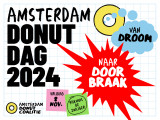
Ben je een buurtinitiatief of bedrijf dat bijdraagt aan een groene en eerlijke stad, en ben je op zoek naar samenwerkingen om de volgende stap te maken? Dan ben je van harte welkom op de Amsterdam Donut Dag op 8 november in Pakhuis de Zwijger!
Het thema van de dag is: ☁️Van Droom naar Doorbraak💥
De Donut Dag bestaat uit twee parallelle programma’s, die in de middag worden samengevoegd:
👉 Een programma voor buurtinitiatieven > in samenwerking met gemeente Amsterdam.
👉 Een ochtendprogramma voor bedrijven > in samenwerking met Center van Economic Transformation (HvA)
👉 Middag: een matchmaking extravaganza tussen beide groepen!
Het dagprogramma op 8 november is besloten, maar het leuke is: we hebben een aantal wild-cards te vergeven!
Je kunt je inschrijven voor het dagprogramma voor maatschappelijke initiatieven of voor bedrijven. Schrijf je in vóór 5 november aan https://lnkd.in/eWaM4amj
Wat haal je eruit? Aan het eind heb je als deelnemer:
✅ Een goed beeld van hoe je je positie en je netwerk in de stad kunt versterken.
✅ Meer inzicht gekregen hoe de principes van de donut economie jou vooruit kunnen helpen
✅ Waardevolle gesprekken met diverse bedrijven en initiatieven
✅ Hopelijk mooie samenwerkingen gesmeed!
Het programma is van 9.30 tot 17.30 en is inclusief lunch en borrel!
Meer info over het programma vind je hier: https://lnkd.in/gADexrKJ
In Residence Open Events program 2025
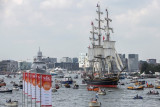
Entrepreneurs test innovations during SAIL and Marathon
Public events like SAIL and the Marathon draw millions of visitors to Amsterdam. These events often take place in central locations where large crowds gather. As a result, various logistical arrangements need to be made, such as providing food and drinks, public toilets, and temporary modifications to streets. These situations pose sustainability and accessibility challenges for the city. However, they also make these events ideal testing grounds for innovations.
Testing with the city and event organizers
The In Residence program offers entrepreneurs the opportunity to test their innovations during public events. They work closely with event organizers, the City of Amsterdam, and an experienced mentor. Additionally, funding is available to support the pilot. If the innovation proves to benefit the city, the municipality may purchase it after the program.
Applications are open from October 1 to November 17. Selected entrepreneurs will prepare their pilot in early 2025, and most pilots will take place during the summer events, especially during SAIL 2025.
Apply via the website: https://innovatiepartners.nl/project/in-residence-open-evenementen-2025
Amsterdam 750th anniversary year
This is the second round of the In Residence Events program. During the 2024 event season, nine entrepreneurs tested their innovations, including at Pride Week, the Marathon, and the Dam tot Dam Run. If successful, innovations from both rounds of the program may be implemented during the events of Amsterdam’s 750th anniversary celebrations.
Interested or any questions? You can get in touch with Mark Stoevelaar (mark.stoevelaar@amsterdam.nl)
Photo: Edwin van Eis
Perspectief op een ‘Gifvrij Europa’ zonder gevaarlijke PFAS
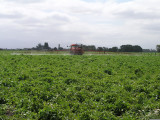
Hoe brengen we Nederlands ZZS beleid en EU beleid “Chemicals Strategy for Sustainability; Towards a Toxic-Free Environment” in de praktijk?
Haast dagelijks horen we over gevaarlijke vervuiling door PFAS, bestrijdingsmiddelen of andere giftige stoffen. Hoe kan dit en vooral, wat zou het Nederlandse beleid moeten zijn voor deze zeer zorgwekkende stoffen in relatie tot het EU beleid 'Chemicals Strategy for Sustainability; Towards a Toxic-Free Environment'? Pakken we dit nu echt goed aan?
Blootstelling aan zeer zorgwekkende stoffen kan leiden tot allerlei ongewenste milieu- en gezondheidseffecten. Er is een lastig spanningsveld tussen de functionaliteit van het gebruik van de diverse chemische stoffen en de ongewenste negatieve effecten op onze gezondheid en het milieu. Waar staan we nu, wat werkt goed in het huidige beleid en waar moet het sterker? Tijdens dit middagsymposium onderzoeken we deze vragen en verdiepen we ons in de knelpunten in consumptiegedrag en essentieel gebruik van ZZS enerzijds en mogelijkheden tot vervanging anderzijds.
Met topsprekers en pitches over oplossingsrichtingen en transitiepaden verkennen we samen met de aanwezigen in de zaal een groene circulaire chemie en brengen we de perspectieven daarvan in beeld. We eindigen met een wetenschappelijk reflectie die echte oplossingen aandraagt. Op deze manier hopen we het bewustzijn en de kennisdeling over een groene circulaire chemie te vergroten en de invoering ervan te stimuleren.
Wees erbij op 9 oktober a.s. en laat je inspireren om bij te dragen aan een duurzamere en gifvrije toekomst!
Voorzitter van het symposium is Bart Krull (SustainLab)
13:00 Ontvangst (met koffie en thee)
13:30 Welkom en opening
- Opening door Antoine Heideveld, (voorzitter VVM, directeur Het Groene Brein) over de relatie van deze middag met Duurzame Dinsdag
- Welkom door Tom Smeelen, sectormanager Gezonde leefomgeving en Klimaat, Provincie Noord-Holland
13:45 Deel 1: Het probleem
Wetenschappelijke feiten en maatschappelijke context blootstelling chemische stoffen en welvaartziekten
- Zorgstoffen, waarom hebben we die?
Het spanningsveld tussen functionaliteit en ongewenste milieu- en gezondheidseffecten in beeld gebracht.
Door Majorie van Duursen, professor Environmental Health and Toxicology, Vrije Universiteit Amsterdam
14:15 Deel 2: Beleid
Een brede schets van het krachtenveld en de bewegingen in het beleid
- Waar staan we nu?
Beleid en aanpak zeer zorgwekkende stoffen Europees (SVHC / Reach / Bestrijdingsmiddelen) en nationaal (ZZS / Impuls Chemische Stoffen). Waar zit de kracht van het beleid, waar moet het mogelijk sterker? Wat zijn de knelpunten in consumptiegedrag en essentieel gebruik van ZZS enerzijds en mogelijkheden tot vervanging anderzijds.
Door Mieke Klooswijk, programmaleider Impulsprogramma Chemische Stoffen, Ministerie van Infrastructuur en Waterstaat
14:45 Pauze (met koffie en thee)
15:15 Deel 3: Pitches over oplossingsrichtingen/transitiepaden voor een groene circulaire chemie
Perspectieven in beeld: industrie, landbouw, politiek, wetenschap en consument. Pitches over de hordes, obstakels, oplossingsrichtingen én successen.
- Industrie: Nieuwe verbindingen voor de chemie (Rosienne Steensma, VNCI)
- Landbouw: Welke mogelijkheden voor en consequenties van vermindering van de impact van gewasbeschermingsmiddelen zijn er? (Volkert Engelsman, EOSTA)
- (Geo)Politiek / Internationalisering: Wat is de betere keuze? (Leo van der Biessen, Royal HaskoningDHV)
- Consumentengedrag: Wat kan en moet er anders? (Thijs Bouman, RUG)
15:45 Deel 4: Het gesprek over oplossingsrichtingen
Dagvoorzitter stelt vragen n.a.v. de pitches en daagt de zaal uit ook vragen te stellen. Een gesprek dat tot echte aanbevelingen leidt...
16:30 Deel 5: Hoe samen verder?
Wetenschap: Reflectie op de pitches en oplossingen vanuit de wetenschap.
Door Prof. Annemarie van Wezel, professor Environmental Ecology, Universiteit van Amsterdam
17:00 Borrel & netwerken
Waag Open: Dead Zones

Kunstenaars kunnen als geen ander een nieuw perspectief bieden op abstracte issues. Kunstenaar Suzette Bousema werkte samen met wetenschappers om actuele klimaatproblemen te visualiseren. Tijdens Waag Open op donderdag 3 oktober vertelt ze over Dead Zones: door de mens veroorzaakte zuurstofloze zones in de oceaan. Bousema presenteert ook haar werk Seaweedfilter, waarin zij verkent hoe zeewierboerderijen extra zuurstof kunnen creëren waar dat nodig is.
Daarna ga je zelf aan de slag met een eigen zeewierkunstwerk met de cyanotype techniek. Cyanotype, of blauwdruk, is een fotografische techniek waarbij de prints een blauwe kleur krijgen door belichting. 
Future Relics (cyanotype) door Suzette Bousema
Over de kunstenaar
Suzette Bousema (NL, 1995) visualiseert hedendaagse milieuonderwerpen in samenwerking met wetenschappers. Zij gebruikt haar kunst als middel om mens en wetenschap te verbinden. Planetaire omstandigheden en onze plaats daarin zijn het uitgangspunt in haar werk; de manier waarop de mens ingrijpt in de natuur en hoe we ons op individueel niveau tot de aarde verhouden. Ze werkt interdisciplinair met fotografie, grafiek, glasblazen, weven, geluid, geur en organische materialen zoals zeewier.
Tussen 19 en 22 september 2024 kun je het werk van Suzette Bousema ook zien in de expositie Behind the Design bij Waag, tijdens GLUE Amsterdam.
Programma
| 19:30 - 19:40 uur | Welkom en introductie |
| 19:40 - 20:40 uur | Presentatie door Suzette Bousema |
| 20:40 - 21:30 uur | Cyanotype kunstwerken maken |
| 21:30 - 22:00 uur | Borrel |
Toegankelijkheid
Mocht je krap bij kas zitten en wel graag aan dit evenement willen deelnemen, neem dan contact op met sanna [@] waag [punt] org.
PIM helps Amsterdam based business owners take steps towards a circular economy
The Programma Investeringsgereed Innovatief Mkb Noord-Holland (PIM NH) is a project initiated by the province of Noord-Holland, supported by the municipality of Amsterdam, and executed by KplusV, Preneurz, and Innovate Today. Through PIM NH, we actively support innovative and sustainable SMEs with growth and financing challenges. Over the past 7 years, we have assisted more than 900 entrepreneurs and helped secure over 250 million euros in financing.
SMEs play a key role in the transition to a circular economy by 2050. The municipality of Amsterdam has committed to supporting these businesses in making this transition. As a result, PIM, on behalf of the municipality of Amsterdam, will assist small and medium-sized business owners in taking steps toward a circular economy.
'PIM Circular Mkb Amsterdam'
PIM helps entrepreneurs achieve their circular ambitions by increasing the success rate of circular business cases and securing financing for their implementation. We provide support for circular challenges such as: "Is my circular business case fundable?" and "What financing options are available for my circular business case?"
For Who is 'PIM Circular Mkb Amsterdam'?
'PIM Circular Mkb Amsterdam' is available to entrepreneurs who:
- Are based in the municipality of Amsterdam;
- Have a minimum turnover of 500,000 euros;
- Have been in business for at least 5 years and have up to 250 employees;
- Have circular ambitions.
More Information
If you're curious about the possibilities for your business or want to sign up for PIM Circular Mkb Amsterdam, please contact us on: jeroen@pimnh.nl
YIMBY Harvest Festival
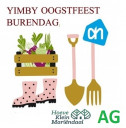
YIMBY Arnhem! is a bottom-up movement aiming at small scale food growing in the city of Arnhem (NL). The 10 ten years of green YIMBY Arnhem! experience shows the fun and cooperation of urban growing food. The YIMBY experience also shows that in time small initiatives grow to major results in empowering green people in the city.
<strong>Green stewardship</strong> More than 50% of the European population currently lives in urban areas, a proportion that is projected to increase to almost 70% by 2050. Distributed small scale urban food growers can together make a difference in providing healthy food in cities, in a climate neutral and sustainable way. The city of Arnhem has the potential to grow 10% of the vegetables and herbs in 2050,
Buurttuinen redden samen ruim 25.000 kilo groente- en fruitafval
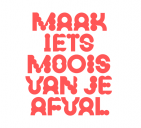
Dankzij de inspanningen van organisatie Afval naar Oogst en honderden vrijwilligers hebben vijftien buurttuinen dit jaar al meer dan 25.000 kilo groente- en fruitafval van de vuilnisbak kunnen redden. Dit resultaat wordt gevierd op 28 september tijdens het Afval naar Oogstfeest. Ook openen er dan elf nieuwe inleverpunten waar Amsterdammers zich kunnen aanmelden om hun gf-afval in te leveren.
Van Afval naar Oogst
Maar liefst een derde van de vuilniszak van Amsterdammers bestaat uit groente-, fruit- en tuinafval, dat nu in de verbrandingsoven belandt. Zonde! Deze keukenresten kunnen we omzetten in een waardevolle grondstof: compost.
Afval naar Oogst maakt het voor Amsterdammers mogelijk om hun schillen en klokhuizen in te leveren bij buurttuinen en stadsboerderijen. De organisatie begeleidt vrijwilligers bij het maken van hoogwaardige compost, die zij weer gebruiken om de tuinen te voeden. Daardoor kunnen er opnieuw groenten, kruiden, fruit en bloemen groeien. Van afval naar oogst dus!
Wist je dat de tuin elk jaar compost nodig heeft om de bodem en dus de planten gezond te houden?
Laagdrempelig en lokaal
Afval naar Oogst begon met één locatie in Amsterdam-West en is inmiddels uitgegroeid tot 22 plekken verspreid over de stad. Tijdens het Afval naar Oogstfeest kunnen bezoekers daar onder andere uitleg krijgen over composteren én zich aanmelden als groente- en fruitafval donateur.
Deelnemer van het GWL-terrein in West: “Ik ben zo blij dat ik in mijn buurt makkelijk een duurzame bijdrage kan leveren. Hier was ik jaren naar op zoek.”
Mooi programma
Tijdens het Afval naar Oogstfeest kun je ook ontdekken wat je nog meer met keukenafval kunt doen. Doe bijvoorbeeld mee aan een workshop verf maken met groenteschillen. Of verdiep je in de wonderlijke wereld van de bodem. In Amsterdam-West kun je meedoen aan een speciale Afval naar Oogst fietsroute! Meer informatie over het programma en de deelnemende locaties vind je op de website of sociale media van Afval naar Oogst. Aanmelden is niet nodig.
Afval naar Oogst slaat aan
Honderden stadsbewoners leveren inmiddels hun groente- en fruitafval in. Ook de gemeente Amsterdam is enthousiast. De stad wil in 2030 zeker 75% van het gft-afval hergebruiken. Afval naar Oogst helpt daarbij door bewustwording te vergroten. Initiatiefnemer Natascha Hagenbeek: “In onze tuinen kunnen Amsterdammers de kringloop zien en ervaren. Compost maken van ‘afval’ is al een prachtig proces. Er vervolgens groente en fruit uit te zien groeien, is betoverend.”
Afval naar Oogstfeest op 28 september
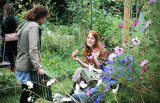
Dankzij de inspanningen van organisatie Afval naar Oogst en honderden vrijwilligers hebben vijftien buurttuinen dit jaar al meer dan 25.000 kilo groente- en fruitafval van de vuilnisbak kunnen redden. Dit resultaat wordt gevierd op 28 september tijdens het Afval naar Oogstfeest. Ook openen er dan elf nieuwe inleverpunten waar Amsterdammers zich kunnen aanmelden om hun gf-afval in te leveren.
Mooi programma
Tijdens het Afval naar Oogstfeest kun je ook ontdekken wat je nog meer met keukenafval kunt doen. Doe bijvoorbeeld mee aan een workshop verf maken met groenteschillen. Of verdiep je in de wonderlijke wereld van de bodem. In Amsterdam-West kun je meedoen aan een speciale Afval naar Oogst fietsroute! Meer informatie over het programma en de deelnemende locaties vind je op de website of sociale media van Afval naar Oogst. Aanmelden is niet nodig.
Waag Open: Met je handen in de klei

Met je handen in de klei is een kleiworkshop met beeldend kunstenaar Esra Sakir in de Waag. Esra is artist in residence bij Voedselpark Amsterdam.
Doe mee en ontdek meer over Amsterdamse klei uit de Lutkemeerpolder. Een natuurlijk materiaal dat uitnodigt tot een gesprek over onze relatie met de grond en voedsel. Wat is nu een betere manier om ideeën te visualiseren dan met je handen in de klei? De workshop duur ongeveer twee uur en al het materiaal wordt door ons verzorgd.
Verzeker jezelf van een plek via de link.
Data Dilemma's verslag: De Voedseltransitie
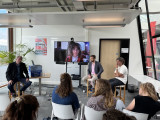
Op 30 mei nodigden we onze community uit bij AMS Institute op het Marineterrein voor een Data Dilemma’s event over de Voedseltransitie. Het ging deze middag over technische dilemma’s rond data en de verduurzaming van voedselketens, en; wat is nou echt lokaal voedsel?
Data Commons: Een digitaal gemeenschapsgoed met een gezamenlijk doel
Jan Wester, directeur van Big Data Value Center, vertelde ons meer over het project ‘Data Value Center Agri & Food Korte Keten’. Aanleiding voor dit project is de transitie naar een duurzamer voedselsysteem waarbij digitalisering en data een belangrijke rol spelen. Er is de wens dat relatief meer voeding uit de regio komt (in plaats van langere ketens), dat er meer transparantie en efficiëntie is in ketensamenwerking en dat er meer informatie wordt vastgelegd over productie en herkomst (denk aan True Pricing). Dit vraagt om een neutraal precompetitief platform. Dit platform kan je zien als een zogenaamde Data Commons: een digitaal gemeenschapsgoed waarin je samen afspraken maakt over het delen van data; wat deel je, met wie, en wat is het gezamenlijke doel ermee?
De Agrifood Data Common is een veilige data-deel omgeving/marktplaats/dashboard, met verschillende gebruikersgroepen. Ondernemers kunnen hiermee bijvoorbeeld markten transparanter maken, ketensamenwerking verbeteren en meervoudige verdienmodellen creëren. Overheden kunnen gebruik maken van de omgeving voor meer evidence-based beleid en het monitoren van impact. Ten slotte kunnen kennisinstellingen gebruik maken van het platform voor de opbouw van referentiedata en het delen van data uit experimenten en fieldlabs. Belangrijk is dat de verschillende partijen vertrouwen met- en in elkaar opbouwen om dit samen te laten werken.
De cateringketen van de Hogeschool van Amsterdam als case
DVC Agri & Food is samen met partners cases aan het bouwen die het nut en belang van dit digitale gemeenschapsgoed in de praktijk tonen. Kees Willem Rademakers van de Hogeschool van Amsterdam vertelde ons meer over het ‘Food Governance 2.0’ project met betrekking op hun eigen cateringketen.
De HvA wilt zich actiever afvragen wat ze van (hun) voedsel vinden en hoe ze een nieuwe rol kunnen spelen in hun eigen lokale voedselsysteem. Ze kijken naar factoren als gezondheid, biodiversiteit, betaalbaarheid en energiegebruik. Als je hier kritisch naar wilt kijken blijkt hoe moeilijk het is om te onderzoeken waar kantineproducten precies vandaan komen. De precieze oorsprong, de reizen die het afgelegd heeft, de arbeidsomstandigheden; het zijn onderdelen waar je als afnemer grip op- of in ieder geval een beeld van wilt hebben. Er is nu een ongelijke machtsverdeling waarbij de leverancier meer data over de keten bezit en dit gebruikt als verdienmodel.
Binnen een keten die digitaal en transparant is georganiseerd, kan de HvA zien wat er nu gebeurt, kan er onderhandeld worden, en kunnen ze samen gaan hervormen waar ze naartoe willen. Het is belangrijk om daarom de governance structuren over voedselketens en de informatiestructuren daarbinnen opnieuw vorm te geven met elkaar. Jan Wester en Kees Willem Rademakers concluderen samen dat deze hervorming vooral zit in wederkerigheid en bereidheid om meer data met elkaar te delen, en de digitale platformen die dit mogelijk maken.
Flevo Campus: Samen werken aan het stedelijk voedselsysteem van de toekomst
Lenno Munnikes vertelde ons meer over lopende initiatieven bij de Flevo Campus. Een organisatie waar onderzoek, onderwijs, ondernemerschap en overheden samenkomen om samen te werken aan het stedelijke voedselsysteem van de toekomst. Hier verbinden ze economische, maatschappelijke en kennis-vraagstukken op het gebied van een duurzame voedseleconomie en een gezonde voedselomgeving.
In een project rond ‘de supermarkt van de toekomst’ zijn ze aan het experimenteren met het verbreden van het assortiment van lokale producten in de schappen. Als je een deel van een supermarkt bijvoorbeeld reserveert voor lokale ondernemers, ontstaat er al sneller een match tussen lokale consumenten en lokale producenten. Ook wordt er gekeken hoe je stadstuinderijen kan ontwikkelen met een mix van verschillende functies. Naast voedselzekerheid, kan zo’n plek ook een belangrijke educatiefunctie vervullen voor kinderen en jongeren in de buurt, kan er onderzoek plaatsvinden, kunnen er nieuwe verdienmodellen worden uitgeprobeerd, en kan de tuin gekoppeld worden aan een zorgcentrum in de buurt.
Ten slotte vertelde Lenno over hun projecten in de zogenaamde Labs. Hier experimenteren ze op kleine schaal om ons aan het denken te zetten over ons voedselsysteem. Een bekend voorbeeld is het hergebruiken van de ‘reststromen’ van de kip. Na slachting wordt zo’n 70% van het dier als reststroom verscheept naar andere continenten. Maar wat als je nou alles van de kip verwerkt? Hoe kan je omgaan met onderdelen van een dier dat je niet opeet? Met deze vragen gingen ze aan de slag en creëerden ze bijvoorbeeld een tasje van de huid, zeep van het vet en keramiek van de botten. Een experiment als dit kan op kleine schaal worden uitgevoerd, maar via nieuwskanalen veel mensen bereiken en aan het denken zetten over ons voedselsysteem.
Onderzoek naar de klimaatimpact van een voedselketen; van verantwoording naar nieuwsgierigheid
Leen Felix, adviseur Agrifood en Biodiversiteit bij Metabolic, nam ons mee in het proces waarmee ze bedrijven adviseert over de duurzaamheid van hun voedselketen. Het begint simpel, bij de ingrediëntenlijst van een product. In plaats van de locatie van de leverancier, moet je echt op zoek naar de productielocatie; het land van herkomst per ingrediënt. De impact van voedselproductie hangt namelijk af van de combinatie van het productieproces en de productielocatie. Maten van landgebruik, bodemtransformatie en uitstoot van broeikasgassen, bijvoorbeeld, hebben ieder een effect op de natuurlijke omgeving. De ruimtelijke context bepaald hoe schadelijk deze processen zijn voor de aarde en het klimaat. Je kan hierbij denken aan de volgende voorbeelden: Het verbouwen van soja, waarbij veel land voor nodig is, is schadelijker als er regenwoud in Brazilië voor wordt gekapt. Het transformeren en homogeniseren van de bodem is schadelijker voor het klimaat, als dit gebeurt op een plek waar voorheen een relatief hoge mate van biodiversiteit aanwezig is. Water-intensieve productieprocessen hebben meer impact op mens en natuur als het plaatsvind op locaties waar water schaars is.
Metabolic koppelt daarom ruimtelijke context aan productieprocessen. Via scores is te zien hoe de negatieve impact van productieprocessen nog sterker is in ‘gebieden met een gevoeligheid’. Dit legt de complexiteit vast waar je in mondiaal voedselsysteem mee te maken hebt. Hoe meer ingrediënten in een product, hoe meer productielocaties, hoe meer factoren die de klimaatimpact beïnvloeden. Het is voor Leen als analist en adviseur de balans zoeken tussen het weergeven van álle data en de complexiteit van de keten, en het adviseren met een platgeslagen verhaal waar de opdrachtgever soms naar op zoek is. Je wilt een bedrijf niet verlammen met de data, maar ze ook wel gericht handvatten geven om bijvoorbeeld risicolocaties en ingrediënten te vermijden.
Leen sluit af met een drietal lessen voor het publiek:
- Perfecte data bestaat niet, en dat is niet eens zo erg: focus op het verhaal wat je ermee kan en wilt overbrengen.
- Van verantwoording naar nieuwsgierigheid: Je kan dus niet 100% verantwoorden en berekenen, maar je moet wel een nieuwsgierige houding tonen over bijvoorbeeld alle bijkomende milieulasten en context risico’s.
- Geen top 10 maar systeemdenken: Duurzaamheid als een simpel thema laten vallen, het is geen top 10 maar denk in systeem met contrasten, schaal, complexiteit, ruilfuncties. ‘One size fits all’ oplossingen werken niet.
Dank aan de sprekers voor hun verhalen en het publiek voor de levendige discussies na afloop. Wil je bij onze volgende Data Dilemma's zijn? De volgende editie van deze serie open events vindt plaats op 16 juli. Ook staan we altijd open voor nieuwe thema’s en onderwerpen voor deze serie; we zijn benieuwd wat voor data dilemma’s jij mee in aanraking komt bij je werk!
No Failure No Glory
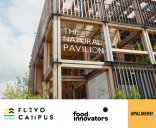
Flevo Campus, Food Innovators and UPALMERE! are organizing this No Failure, No Glory evening.
Entrepreneurship is having courage, seizing opportunities, and above all, sticking your neck out. Mostly with success and at the same time, running the risk of making wrong decisions due to all the challenges.
Often the focus is on the successes, and we like to share those, but there is much to be learned from mistakes others have already made. That's why Flevo Campus and UPALMERE! are organizing this No Failure, No Glory evening. Let yourself be nourished and inspired by candid entrepreneurial stories.
Program:
Networking with Drinks and Bites: From 17:00 to 17:30, you can network in a relaxed atmosphere and enjoy delicious snacks and drinks.
From 17:30-18:00 we start the No Failure, No Glory stories: Led by Janno Lanjouw, journalist at Flevo Campus, various entrepreneurs will share their most instructive moments of failure in sessions of 15 minutes each. Expect vulnerable, yet humorous stories about companies that struggled in the start-up phase, reacted too late to market changes, or were ahead of their time. What went wrong? And what did they learn from it and how did it make them more successful?
Q&A: After each story, you have the opportunity to ask your questions. Dive deeper into the experiences of these entrepreneurs and learn from their insights.
Wrap Up and Drinks: At 19:00, we will conclude the evening with drinks, giving you the opportunity to continue conversations, exchange ideas, and make new connections.
Sign up via link and join this event!
True Price Lab is launched

The True Price Lab is a project focusing on willingness to pay the true price for food and drink.
From 26 February to mid-June 2024, the restaurant and espresso bar in the Corry Tendeloo Building of the Amsterdam University of Applied Sciences will be dedicated to the True Price Lab. For four months, students and staff will be able to choose between paying the normal or true price for a number of products. This project is an initial exploration of consumers' willingness to pay the true price, which includes hidden environmental and social-impact costs.
True price versus consumer price
The true price can be defined as the price applicable after calculating and improving the true price of a product. The true price is based on the retail price plus the sum total of external social and environmental costs. Traditional pricing disregards these external costs, which are effectively paid for by society. For example, the retail price of a cup of coffee does not include the environmental damage of pest control or the underpayment of the farmers who grow the coffee.
The full extra amount that participants pay when they voluntarily opt for the true price will go to the non-profit organisation Solidaridad. Solidaridad wants to make the world a place where everything is made and bought in solidarity with people, the environment and future generations. Visitors to the restaurant and espresso bar can learn more about what their contributions will be used for by scanning a QR code.
Startup Hero Journey Program 2024
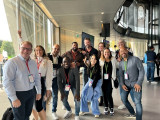
Join UPALMERE!'s Start-up Hero Journey 2024 and take your start-up to the next level.
Are you based in Almere or are you willing to settle there and are you willing to challenge yourself and investigate how your startup can contribute to a better world and thus scale internationally? Then this is your perfect opportunity to grow and realize your international ambitions.
The Startup Hero Journey program offers a series of inspiring sessions, masterclasses and events from late May to October that immerse you in the world of innovation and entrepreneurship. In our pre-accelerator program, you will not only develop your entrepreneurial potential under the guidance of experts and experienced mentors, but you will also discover new perspectives and join a network of like-minded entrepreneurs. Prepare for a journey that transforms your business and contributes to a more sustainable future.
Program in Dutch.
Using legal instruments for a circular food system

Interactive knowledge sharing organized by CircuLaw and the municipality of Amsterdam about how decentralized authorities can use existing legislation and regulations to accelerate the circular economy. With the concrete case of combating food waste, for which 19 legal instruments within a new theme have recently been shared on the CircuLaw platform.
March 12, 2024 - 11:30 - 13:00
- Sustainalab Amsterdam / Hybrid
- Science Park 301
During this knowledge session we will discuss how current legislation and regulations can be implemented by decentralized authorities (municipalities, provinces). are used to accelerate the circular economy. A policymaker from the municipality of Amsterdam, a lawyer and a researcher sit at the table. Policymakers and others can ask questions online in this interactive session.
Are you an innovative entrepreneur? The In Residence Open Events program might be your chance to cooperate with Amsterdam!

Want to test your innovation during an open event such as Amsterdam Pride or the Amsterdam marathon? And looking for the opportunity to cooperate with the city in the long run?
The In Residence Open Events programme might be something for you. We have 8 broad defined challenges, ranging from circular economy to safety, from mobility to extreme whether. Basically we're looking for all innovations that can have an positive impact on the city and the event of the future!
During the programme you get:
- The opportunity to pilot your solution at an open event in Amsterdam, such as Amsterdam Pride or the Amsterdam Marathon
- 15K test budget to execute this pilot
- Guidance by an experienced mentor
- Access to the large municipality network
- The opportunity for long term cooperation in case of a succesfull pilot
- Large exposure and feedback opportunities
Interested to see our programme, the challenges and opportunity this brings for you?
See our website, www.innovatiepartners.nl, or see most recent LinkedIn post: https://www.linkedin.com/posts/gemeente-amsterdam-innovatie_inresidence-amsterdam-innovatie-activity-7163881081757253632-6soh?utm_source=share&utm_medium=member_desktop
For questions or thoughts, you can reach out to Mark Stoevelaar, project manager of the In Residence programme.
- mark.stoevelaar@amsterdam.nl
- +31621193028
Stay up to date
Get notified about new updates, opportunities or events that match your interests.

